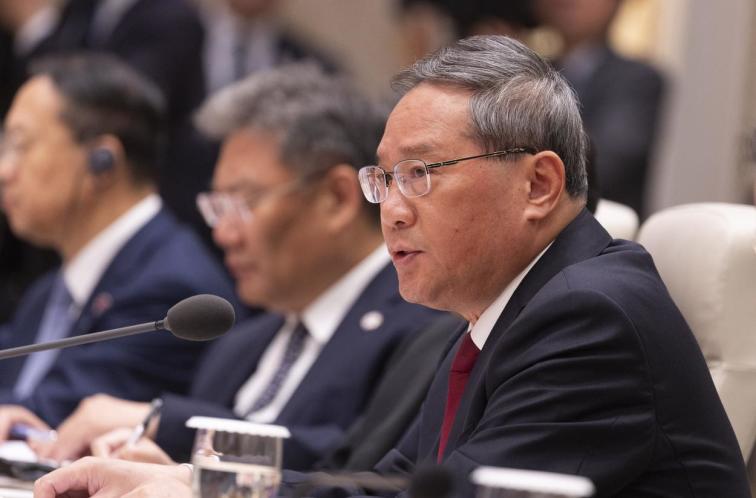Tiananmen Square in Beijing (Lintao Zhang/Getty Images)
[People News] On the eve of the CCP’s so-called September 3rd military parade, Beijing has been gripped by an eerie atmosphere, with frequent anomalies: strict controls, mysterious internet blackouts, and large numbers of tanks flooding the city and parked openly on the streets. Against the backdrop of fierce infighting within the CCP leadership and regime instability, political insiders have been speculating about Beijing’s abnormal situation, trying to interpret the true intentions of Xi Jinping and anti-Xi factions.
China is set to hold a military parade on September 3 to mark the 80th anniversary of victory in the War of Resistance Against Japan. On the night of August 16, the second parade rehearsal took place, with road closures covering an even wider range than before.
According to ETTV News, shopping malls near Beijing’s Wangfujing business district, close to Tiananmen Square, were already locked up before 2:00 p.m. Nearly all shopping malls were emptied of people, stores closed, and police blocked intersections. Most malls even had police stationed inside. Alongside early closures, Chang’an Avenue and Fuxingmen Inner Street were fully sealed off, fenced with barricades, and patrolled by large police forces dispersing citizens.
Videos posted online show large numbers of tanks driving openly into Beijing. The tanks were covered with metal sheets labeled “road inspection vehicles.”
The account “Officialdom (Battleground) Observation Studio, Zhaoming” commented that the reason for covering tanks may have been to avoid reminding Beijing residents of the June 4, 1989 Tiananmen Square massacre.
The same source further analyzed that the sudden deployment of tanks on Beijing’s streets, under the pretext of a “parade rehearsal,” in fact enabled the authorities to impose military control over the city and pressure CCP officials soon to attend the Beidaihe meeting and the upcoming Fourth Plenum. It speculated that only Zhang Youxia, Vice Chairman of the Central Military Commission — known for being “well-versed in military strategy and crafty” — could have devised such a plan, urging Xi Jinping to “flee before he is overthrown.”
Another commentator, “Xier Weng,” shared a similar view: “No outside troops can enter Beijing without approval from the Central Military Commission. Railway transport has military representatives, and it would be impossible to move troops without authorization. Even if the army arrived by train, tanks cannot disembark without railway yard equipment. The Beijing Garrison controls the key entrances into the city. Therefore, it’s unlikely this was a rebel army — more likely it was Zhang Youxia reinforcing ground forces, preparing for major action.”
Videos also show tanks stopped on the streets, with several large buses deliberately blocking their path.
On X, user Xie Wanjun wrote: “A large number of tanks entered Beijing, but several buses intentionally parked across the road to block them. The hostile stance between the buses and the tanks was obvious.”
He further argued: “When the armored units were blocked, no officers got out to direct or negotiate — meaning they were in combat readiness mode. Therefore, these tanks were not for the parade rehearsal but for a military operation.”
Another X user, Cai Shenkun, cautioned against jumping to conclusions. He said that deducing a “military coup” in Zhongnanhai simply from video of tanks with metal covers was overly simplistic and idealistic. Cai pointed out that, although people inside and outside the CCP and across China and abroad hope for major political change, “reality remains harsh.” After reviewing multiple sources, he concluded Xi Jinping’s grip on power is unlikely to collapse in the short term.
On August 12, Beijing Unicom suddenly experienced a massive service outage, with many apps — WeChat, Weibo, Douyin — inaccessible. The next day, Beijing Mobile also crashed, with users unable even to make phone calls. Alibaba Cloud blamed telecom operators, but the two days of outages, coinciding with heightened restrictions, sparked speculation. Earlier, on August 9, Beijing had also seen unusual scenes, with large numbers of military and ambulance vehicles on the streets.
Independent commentator Chen Pokong said on his program that the drills before the September 3 parade were meant to prepare for possible protests or unrest. The first measure in such an event would be to cut off internet access, preventing communication among citizens, businesses, and vehicles.
Chen further analyzed that while the CCP may frame this as a rehearsal against civil unrest, it could also be a precaution against an internal military mutiny. “An internal coup is even more dangerous than a civilian uprising because insiders already hold power, weapons, ammunition, and the ability to mobilize troops and vehicles.”
He argued that if such a mutiny did occur, Xi Jinping might try to counter it by using his control over networks — cutting off internet and electricity — to paralyze military communications and movements.
Beijing’s Traffic Management Bureau recently announced temporary road closures in Tiananmen and surrounding areas from August 15 to 17. Tiananmen Square itself would be closed from August 20 to 23.
Currently, Beijing is under high-pressure security. Along Chang’an Avenue in front of Tiananmen Square, police, soldiers, and plainclothes officers are stationed densely — “guards every three steps, sentries every five steps.”











News magazine bootstrap themes!
I like this themes, fast loading and look profesional
Thank you Carlos!
You're welcome!
Please support me with give positive rating!
Yes Sure!